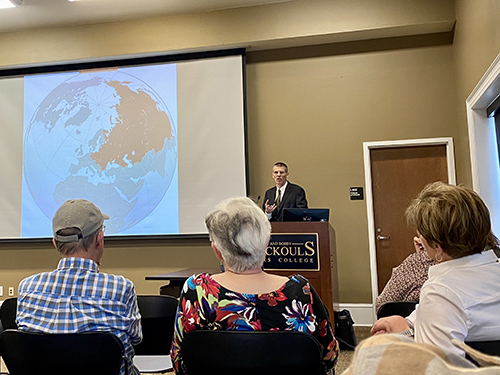MSU professor details Russia-Ukraine history, which dates back more than a millennium
Contact: James Carskadon

STARKVILLE, Miss.—As the armed conflict between Russian and Ukraine enters its second month, Mississippi State Associate Professor of History Stephen Brain detailed more than 1,000 years of history involving the two countries during a public lecture Tuesday [March 29].
The event was hosted by MSU’s Institute for the Humanities. During the lecture, Brain explained that the shared history between Russia and Ukraine dates back to the 800s and the establishment of Kievan Rus, an early version of the Russian state that was based in Kiev, the current capital of Ukraine. Brain said Russian President Vladimir Putin views Ukraine’s independence, which first began after the fall of the Soviet Union, as a 20th century invention.
“During the last 30 years, Ukraine has been drifting towards Europe and away from Russia, economically and culturally,” Brain said. “During that same time period, many countries formerly in the Russian or Soviet sphere of influence have requested and been granted NATO status, threatening Russia with the loss of their former Soviet empire. Ukraine has been expressing interest in joining NATO as well. One month ago, Putin decided these trends have gone far enough and that the unity of the Slavic people should be re-established while there is still time to do so. Ukrainians apparently do not agree.”
Brain, MSU’s Humanities Teacher of the Year in 2016, specializes in Soviet/Russian history. As a 2013-14 Fulbright recipient, Brain traveled to Rostov-on-Don, Russia, where he and his family lived and worked 30 miles from the Ukraine border. In 2005-06, Brain was awarded a Fulbright fellowship to Moscow, Russia, where he worked in the State Archive of the Russian Federation, Russian State Economic Archive, Moscow Oblast Regional Archives, and the Archive of the Communist Party. He has taught a variety of undergraduate and graduate courses over the years, including classes on Russian, Soviet Union and European history.
Brain noted that the shared history between the two countries includes the formation of Eastern Orthodox Christianity as an early state religion and Peter the Great’s first major victory, which led to him becoming emperor in the late 1600s and early 1700s. The most significant period of political separation came when the Mongol empire invaded in the 1200s and leaders in Moscow cooperated with the Mongols while leaders in Kiev, with a more established history and identity, resisted. Moscow would go on to grow stronger while Kiev grew weaker, Brain said.
Ukraine would eventually become a key part of the Soviet Union as a major agricultural producer. When agriculture was collectivized in 1929, tensions began to arise between Ukraine’s agricultural community of farmers and peasants and Soviet leadership in Moscow. As some farmers tried to hide their grain from Soviet authorities, they were interrogated and punished as enemies of the state. By 1932, the region was in the midst of a man-made famine, known as the Holodomor, that killed millions of Ukrainians, explained Brain.
“For Ukrainian nationalists, nothing like this can ever happen again,” Brain said. “The president of Ukraine has said that if they lose this war, the people of Ukraine will pay for generations, and I’m sure he’s thinking about this.”
Brain compared the current situation to the American War of Independence, when the American colonies sought independence from England despite a shared culture, language and Protestant religion.
“Ukraine is fighting a national war of independence, while Russia is fighting for the retention of empire,” Brain said. “What happens next? We’ll have to watch together.”
Part of MSU’s College of Arts and Sciences, the Institute for the Humanities promotes research, scholarship and creative performances in the humanistic disciplines and raises their visibility, both within Mississippi State University and the wider community. For more, visit www.ih.msstate.edu.
MSU is Mississippi’s leading university, available online at www.msstate.edu.